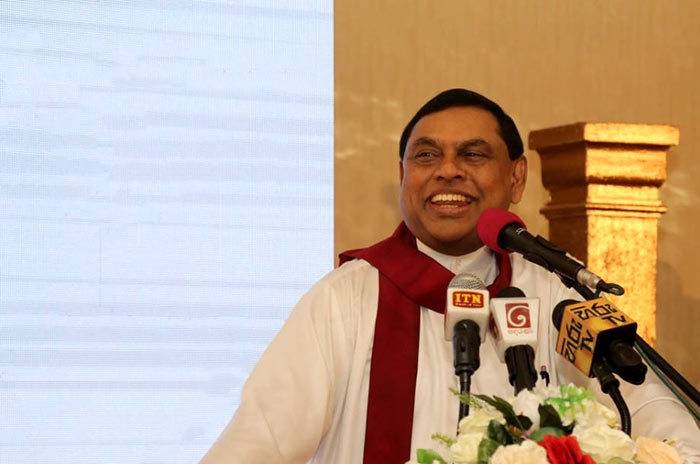No outsider will interfere in Sri Lanka polls this time – Basil

No international actor will try to interfere in Sri Lanka’s approaching presidential election, said Basil Rajapaksa, chief strategist of his brother Gotabaya Rajapaksa’s presidential bid.
“Ethically, that is how it should be,” he told The Hindu in an interview, alluding to a shift in the international community’s “role” in Sri Lanka’s national politics.
His comments, coming a month before the November 16 presidential election, revealed a more obvious shift in the Rajapaksas’ thinking.
After being unseated from office in 2015, his other brother Mahinda Rajapaksa accused India’s Research and Analysis Wing, among others, of backing regime change, because of his perceived “China-tilt”. Taking a different line, Mr. Basil said: “Personally I have no evidence that India or any other country supported them [the opposition coalition].” But now “we have very well understood” what went wrong, he said, adding: “If they had worked to change our government earlier, we have corrected the situation [now].”
“India is our number one friend and neighbour so we have to always go with India, in political and security matters, but in economic and other matters you can’t forget China,” he said.
A powerful minister in the Rajapaksa government, Mr. Basil faces charges of large-scale corruption. After he was briefly arrested in 2015 and later released on bail, he wasted no time in beginning the ground work for their fight back after the 2015 defeat. He not only set up the Sri Lanka Podujana Peramuna (People’s Party or SLPP) in 2016 as their new vehicle, but also crafted a sharp campaign ahead of the 2018 local authority elections.
The SLPP won over 40% of the vote, pushing the ruling United National Party to a second spot, and the Sri Lanka Freedom Party (SLFP) to the third place. Their big win signalled the electoral resurgence of the Rajapaksa camp, even as it heralded the fall of the SLFP, where the Rajapaksas built their political careers.
Numbers matter
The SLPP headquarters located near the Sri Lankan Parliament was teeming with young volunteers on Friday. At Mr. Basil’s office was a huge digital monitor facing him. It displayed a big map of Sri Lanka, with many red dots flashing. “This is an app that we have developed especially for this election, to monitor canvassing activity at each district in real time,” he said.
Asked how the numbers looked, Mr. Basil Rajapaksa said: “We are addressing human beings, it is important to connect with people on the ground. Numbers are only for targets.”
Sri Lanka has some 15.99 million registered voters. If about 80% poll like last time, it would translate to approximately 12 million valid votes, in his reading. “Our target is 6.5 million votes,” he said, confident of getting past the 50 % mark that is necessary to win.
He knows that is not easy. “40 % was enough for a local poll but won’t do for a national election.” That is why the SLFP’s support – recently declared – is crucial, in his view. As are the votes of minority communities. Sections remain averse to the SLPP candidate Mr. Gotabaya Rajapaksa, a former defence secretary accused of being linked to several war-time killings, enforced disappearances and later, to groups behind anti-Muslim violence.
But their vote is “very important”, Mr. Basil admitted. Tamils “cannot forget what happened” but people of both communities “should forgive each other.” However, Mr. Basil seemed wary of committing to a constitutional settlement to the national question. The Sri Lankan Parliament, including MPs aligned to Mr. Mahinda, unanimously voted for a new Constitution in 2015, but he deemed a referendum necessary. “Let people decide if we need a new Constitution,” he said, adding that the party was “committed to maximum devolution” – a failed promise familiar to the Tamil electorate.
Asked how his party viewed the presidency now – significantly weakened after a 2015 – Mr. Basil said: “No matter who our candidate or President is, our leader [Mahinda Rajapaksa] will the head of the government [as PM]. So, this arrangement suits us well. He is our leader, and he is the spiritual leader of our country.”
(Source: The Hindu)
Latest Headlines in Sri Lanka
- Sri Lanka introduces digital fuel card system for government vehicles January 20, 2026
- Sri Lanka raises private sector minimum wage to Rs. 30,000 January 20, 2026
- Man arrested with Rs. 283.3 Million, vehicles seized January 20, 2026
- Five arrested over Jinthupitiya shooting that killed one and injured two children January 20, 2026
- NIE Deputy Director General sent on compulsory leave over Grade 6 textbook January 19, 2026


